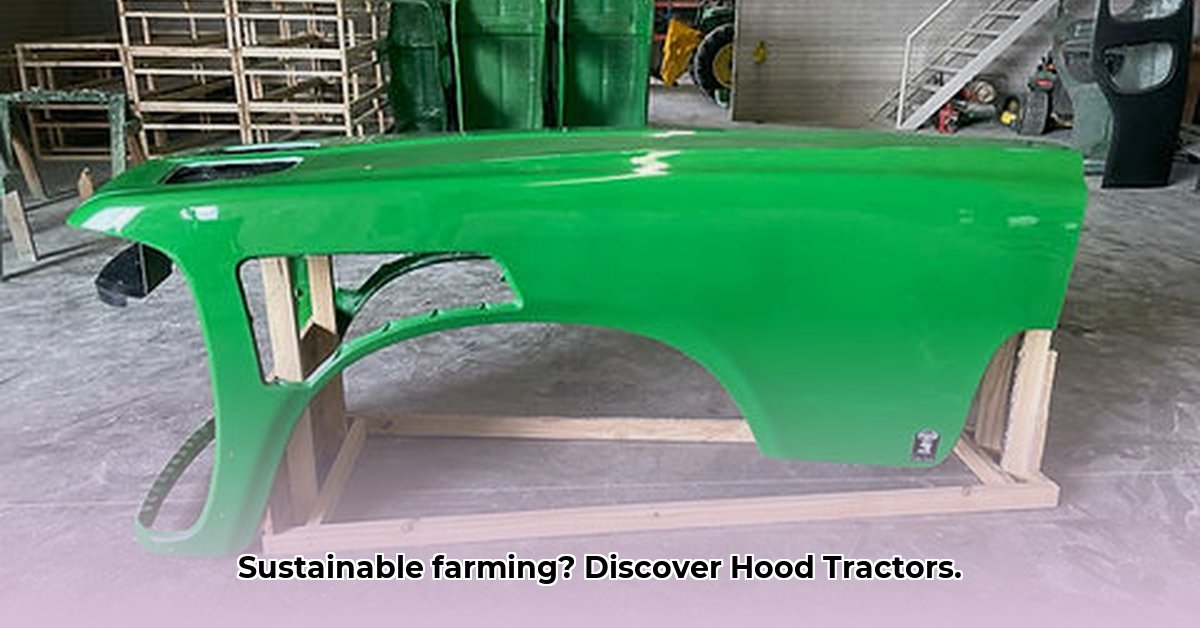
Hood Equipment: A Family Legacy in a Changing Agricultural Landscape
The rhythmic chug of a tractor engine, the scent of freshly turned earth – these are the hallmarks of the Hudson family's life. For generations, they've run Hood Equipment, a local dealership renowned for its reliable tractors and personalized service. But the farming landscape is changing, and sustainable agriculture is no longer a trend, but a necessity. Hood Equipment, like many family-run businesses, is navigating this shift, balancing tradition with innovation to ensure its continued success. How are they adapting? By embracing the opportunities and challenges of a rapidly evolving market, focusing on community, and strategically adopting new technologies. For more advanced equipment options, check out this Kubota Tractor.
The Hudsons initially focused on supplying sturdy, dependable tractors, serving both large corporate farms and smaller family-run operations. However, the increasing demand for eco-friendly farming practices has presented both challenges and new opportunities. Larger farms are investing heavily in high-horsepower tractors (25 to 300 horsepower) to maximize efficiency, while smaller farms grapple with accessing the latest technology and financing. This presents Hood Equipment with a unique opportunity to not only serve existing customers but also to attract a new wave of environmentally conscious farmers. Isn't this a crucial turning point for the agricultural sector? The Hudsons have recognized this shift and are using it to modernize their business strategy.
More Than Just Machines: The Hood Advantage
What distinguishes Hood Equipment from larger, impersonal corporations? It's the personal touch. They don't merely sell tractors; they cultivate long-term relationships with their customers. They understand their communities – their needs, their challenges, and their aspirations. This deep understanding allows Hood Equipment to tailor its solutions and support to each customer's unique requirements. In an increasingly digital world, this personalized approach is a significant differentiator, fostering trust and loyalty that transcends mere transactions. This personalized service ensures stronger relationships with customers.
Charting a Course for Success: Actionable Steps
Hood Equipment's strategy for sustainable success is a blend of short-term and long-term goals, demonstrating their proactive approach to the changing market. They aren't just reacting; they are shaping their future.
Short-Term Goals (Within One Year)
Enhance Online Presence: A strong online presence is crucial for attracting new customers. This involves investing in professional website design, search engine optimization (SEO), and compelling content showcasing their commitment to sustainable solutions. This will improve brand visibility and reach.
Invest in Service Training: Exceptional service fosters customer loyalty. Hood Equipment plans to invest in training programs for their mechanics, ensuring efficient and effective tractor maintenance and repair. Proactive maintenance minimizes downtime and maximizes customer satisfaction.
Expand Used Equipment Inventory: Offering a wider range of pre-owned equipment caters to budget-conscious farmers looking to adopt sustainable practices. Rigorous inspections and fair pricing ensure customer trust and satisfaction. This strategy expands their market reach and caters to a wider customer base.
Long-Term Vision (Over the Next 3-5 Years)
Embrace Technological Advancements: The agricultural sector is rapidly evolving. Hood Equipment plans to invest in and understand precision agriculture, automation, and other innovative technologies, potentially through partnerships or training programs. Adopting new technologies improves efficiency and long-term viability.
Build Strategic Alliances: Collaboration is key. Hood Equipment aims to build strong relationships with technology providers, other businesses in the agricultural sector, and local government agencies; fostering a network of support and shared expertise. Partnerships allow for diversification and expand market reach.
Launch Sustainability Certification Programs: Demonstrating a commitment to environmental stewardship strengthens their brand and attracts environmentally conscious customers and partners. This might include implementing sustainable practices within their own operations and obtaining relevant certifications. Certifications boost credibility and attract new customers.
Understanding the Risks: Mitigating Challenges
Adopting new technologies and sustainable practices presents inherent risks. Let's examine these challenges and their mitigation strategies:
| Technology/Practice | Potential Risks | Mitigation Strategies |
|---|---|---|
| High-Horsepower Tractor Adoption | High initial investment, potential environmental impact | Thorough financial planning, operator training, environmental impact assessments |
| Used Equipment Purchases | Mechanical issues, lack of warranty protection | Rigorous inspections, extended warranties, access to reliable repair services |
| Precision Agriculture Technologies | Data security breaches, high complexity | Phased implementation, robust data security measures, comprehensive training programs |
| Renewable Energy on Farms (solar, etc.) | High upfront costs, potential for system failures | Government incentives, feasibility studies, reliable technical support |
The Future is Green: Hood Tractors Leading the Way
The future of farming is undoubtedly sustainable. Dealerships like Hood Equipment, which proactively adapt, innovate, and prioritize customer relationships, are poised for significant growth. The Hudsons' commitment to community engagement and technological advancement sets them up as leaders in the sustainable agriculture movement. Their success serves as a model for other businesses seeking to thrive in this evolving landscape.